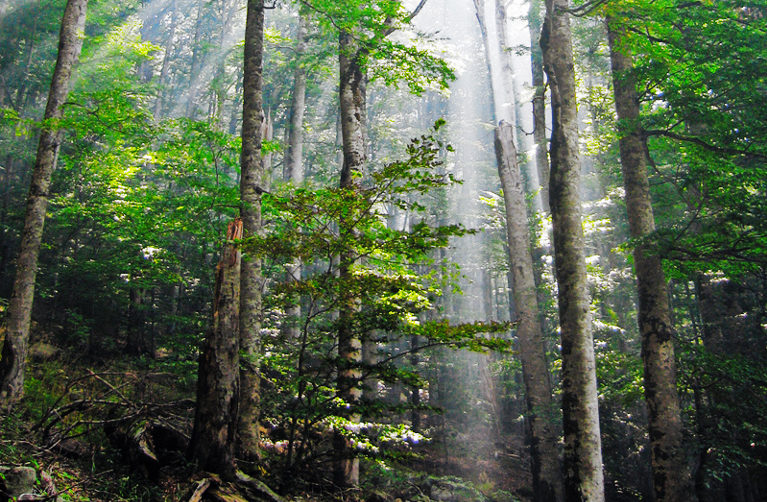Darwin’s revolutionary discovery–that humans are entirely natural–has had little effect on how we think about human civilization. We share 90% of our genes with mice, 84% of our genes with dogs, and 60% of our genes with bananas and still we think of ourselves as being outside nature. We assume that we are at war with “nature” and that nature must be turned to our ends.
The result has been disastrous for the planet. We have cut down three trillion trees, making room for human agriculture and cities. Millions of species have paid the price of our civilization. The current extinction rate is a thousand times the pre-human background rate– and increasing. At the rate we are going, 30-40% of the life-forms on the planet today will vanish in the next hundred years.
And we have “succeeded” in warming the planet, acidifying the oceans, depleting topsoil faster than it can be replenished, and overfishing the seas. China is now depleting its topsoil at 40X its natural replacement rate; the US is doing the same but at “only”10X the replacement rate. In a third of the world’s fisheries fish are being caught faster than they can reproduce. We cannot sustain this type of progress.
Some are suggesting planting a trillion trees to fight global warming. Reforestation can pull hundreds of billions of tons of carbon from the atmosphere, help to cool the planet, and slow ocean acidification. We need to do this.
Others are advocating for “rewilding” large areas of land to attenuate the massive species extinction currently underway. Restoring the integrity of habitats, returning portions of the earth to other species, and restoring functional ecosystems can reduce biodiversity loss. We need to do this.
But neither proposal, or the two together, is sufficient. Planting a trillion trees and rewilding large areas of the planet without changing the fundamental nature of our civilization will only forestall the inevitable. We must create a new kind of civilization.
What we identify as Western Civilization has been based on a lie—that human beings are not fully natural. So long as the lie goes unchallenged, the consequences cannot be avoided. We must build a civilization based on the truth that we are biological beings and that our well-being is inextricably tied up with the well-being of millions of other species. We need to build an ecological civilization.
We have understood civilization to refer to highly developed, densely organized societies that enable intellectual and creative advancements. But these societies have almost always come with hierarchies of power, gross inequality, excessive military expenditures, abusive human relations, and the misuse of nature. For good reason, some conclude that for the sake of life itself, human civilization ought to be abandoned.
Many others argue that we cannot afford to take land out of cultivation in order to plant a trillion trees or provide wilderness for other species. What they mean is that, given the way we have currently structured our civilization, we cannot afford to do these things. This is true. We cannot afford to reforest or rewild the planet at the same time that we subsidize the oil and gas industry, lower taxes on the wealthy, expand the military budget, and think of the economy as something that must be fed at all costs. Civilization as it is now conceived and constructed cannot afford to do the very things that are necessary to preserve human civilization.
The fact that we have not yet figured out how to sustain highly developed societies that are socially just and compatible with a thriving ecosystem, does not mean that we cannot do so. The past has a strong hold, but its repetition is not inevitable. We cannot surrender to some indulgent notion of fate. Everything rides on rethinking civilization as we now know it.
What would such a civilization (or civilizations) look like? We know some of the elements. More trees. Fewer cattle. More wilderness. Fewer cars. More cities. Less social inequality. More equitable distribution of wealth. Less money allocated to maintaining extravagant military capacities. More money allocated to health, education, and beauty. At every point, we need to ask what it means to create a civilization that is based on what we know to be true—that we are natural beings, dependent on all other life forms.
We have not done this before. But we need to do this now..
Maintaining the current trajectory is suicidal—or more correctly, ecocidal. When previous civilizations collapsed, their effects were mostly local and limited. Our current civilization is planetary and the consequences will be global. The planet will not soon recover from our failures as a civilization.
The most hopeful and inspiring project of our time is rethinking civilization, reforesting the earth, and rewilding the planet. It is a single project and the most important one we can undertake.
Teaser photo credit: By Snežana Trifunović – Own work, CC BY-SA 3.0





